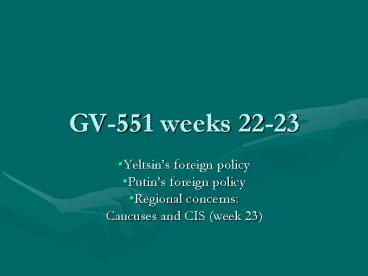GV551 weeks 2223 - PowerPoint PPT Presentation
1 / 9
Title:
GV551 weeks 2223
Description:
During the peak of his strength Yeltsin full control over foreign policy no role ... US-Russian relations and strategic arms ... Geopolitics and geoeconomics ... – PowerPoint PPT presentation
Number of Views:42
Avg rating:3.0/5.0
Title: GV551 weeks 2223
1
GV-551 weeks 22-23
- Yeltsins foreign policy
- Putins foreign policy
- Regional concerns
- Caucuses and CIS (week 23)
2
Foreign Policy under Yeltsin
- During the peak of his strength Yeltsin full
control over foreign policyno role for Duma - Security Council
- US-Russian relations and strategic arms
negotiations (START I II) - Kozyrevs foreign policy (more conservative)
- Slowly whining powercontradictory policies
- Yeltsins legacy
- Erratic and incoherent foreign policy the first 3
years structural, state, and individual levels
of analysis - 1994 speech mixture of harsh and conciliatory
tones - 1995 speech more mellow
- 1996 foreign policy not prominent
3
Foreign Policy under Yeltsin
- Structural (external factors)
- End of Cold War change in power status of Russia
- Geopolitical realities
- State level lack of coherent foreign policy
institutions - Power struggles among bureaucracies
- Security Council vs. Federal Council
- Unclear rules and institutionslack of
coordination (Institutions do matter) - unclear guidelines and division of labour between
MFA and president - Duma and FC right to ratify treaties
- Duma and FC attempts to use FP for domestic
interests - Issue of Russian identity
- Restructuring of state
- Individual level Yeltsins personality and
popularity
4
Policy concerns under Yeltsin
- Ambivalence of foreign policy
- Identity in the case of Europe
- Power status in the case of US
- Issue of NATO and NATO expansion from
partnership to uneasy relationship - Former Yugoslavia
- Bilateral and Multilateral arms control treaties
- START I II
- ABM treaty
5
Main guidelines of Kozyrevs FP
- Departure from Gorbachevs New Thinking
- Democratic principles and peaceful policies (per
democratic peace theory) - No threat from other democracies
- Russia a great power with the following goals
- National security and sovereignty using peaceful
means - Building ties with other neighbours
- Failure of Kozyrevs policy
- Domestic struggles between conservatives
(forceful security of southern borders) vs.
liberals (Russian influence through regional
institutions)
6
Primakov
- Signalling departure from West as an area of
interest - Main policy guidelines under Primakov
- Opposition to NATOs expansion into the former
Eastern bloc - But, he singed Foundation Act, ending Cold War
hostilities - Advocated multilateralism to counterbalance US
global hegemony - Low- cost mediation towards the Middle East and
near abroad (Primakov doctrine) - Promoted relations with China, India, and Iran to
counterbalance the US - Overall Russias national interests remain the
same (enduring interests) - Russia's first foreign policy objective must be
to reverse Russia's internal decline - Russian sphere of influence within the region
(Differences over means rather than goals) - Maintenance of Russia's nuclear superpower status
7
Putin and Ivanov
- Putin had a clean slate
- Background that guarantees respect from home and
access to foreign resources and leaders - Satisfy both Westernizers and Conservatives
- Rebuild consensus over the identity issue
- Eurocentrist but in a balancing way
- Putins targets
- Use democratization to his advantage build
support by the population - Promote consistent and strong leadership
- Depoliticize foreign policy (away from parties
and domestic policies) - Build consensus among multiple bureaucracies
- New doctrine under Putin
8
Putins doctrine
- Hardening of defence and security policy
- possibility "of using all forces and means at its
disposal, including nuclear weapons, where all
other means to settle the crisis have been
exhausted or have proved ineffective." - Focusing on economic interests, the rights of
Russians abroad, and intelligence gathering - Resolve territorial concerns
9
Putins goals
- Geopolitics and geoeconomics
- Economic revival as a condition for major power
statusdifferent understanding of economics and
trade - Energy dependency of Europe used to be admitted
in other policy areas - Evolution of zero-sum gain thinking
- Issues of nuclear proliferation and transnational
terrorism































